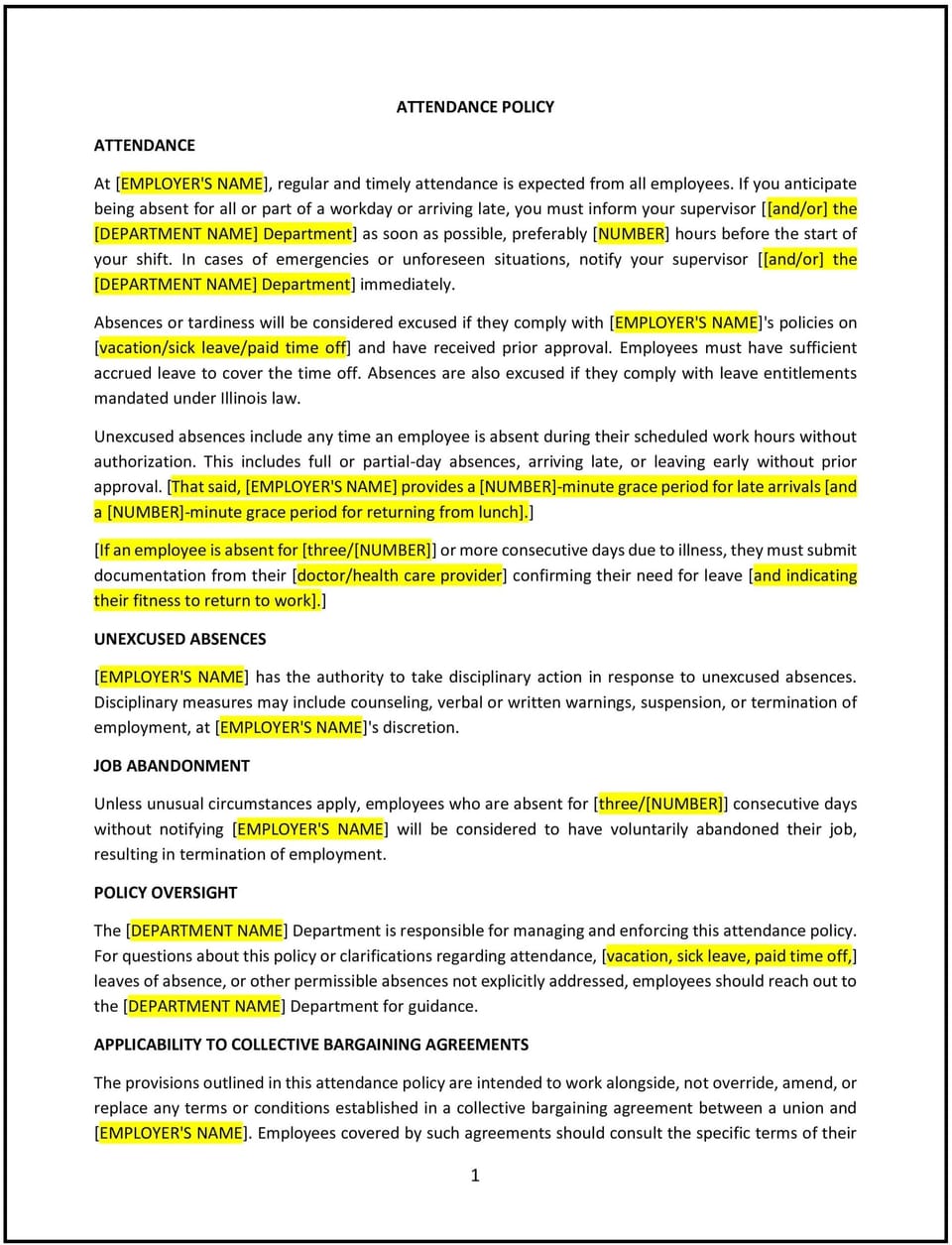Attendance policy (Illinois): Free template

Attendance policy (Illinois)
This attendance policy is designed to help Illinois businesses manage employee attendance by outlining clear expectations for punctuality, leave, and the handling of absences. It aims to support business operations while accommodating employee needs and improving compliance with Illinois employment laws.
By adopting this policy, businesses can promote accountability, improve scheduling, and address attendance-related challenges effectively.
How to use this attendance policy (Illinois)
- Define attendance expectations: Specify standard work hours, the importance of punctuality, and expectations for regular attendance.
- Address acceptable absences: List acceptable reasons for absence, such as illness, family emergencies, or personal leave, and outline the process for notifying management.
- Set notification procedures: Provide clear instructions for how employees should report absences, including required advance notice and acceptable communication methods.
- Include paid and unpaid leave: Detail available leave options, such as paid time off (PTO), sick days, or unpaid leave, and explain how they are managed under Illinois law.
- Specify consequences for excessive absences: Outline steps for addressing frequent or unexcused absences, including verbal warnings, written notices, or other disciplinary actions.
- Address tardiness: Establish guidelines for handling late arrivals, including what constitutes excessive tardiness and potential consequences.
- Require medical documentation: Specify when employees need to provide medical documentation for absences, such as after extended or frequent sick leave.
- Monitor compliance: Ensure the policy aligns with Illinois labor laws, including regulations related to paid sick leave and employee rights.
Benefits of using this attendance policy (Illinois)
This policy provides several benefits for Illinois businesses:
- Promotes accountability: Encourages employees to adhere to attendance expectations, improving productivity and operational efficiency.
- Supports fairness: Establishes consistent guidelines for managing attendance across all employees.
- Enhances planning: Provides a framework for addressing absences and tardiness, helping managers schedule effectively.
- Aligns with legal requirements: Improves compliance with Illinois laws, including the Paid Leave for All Workers Act and other relevant regulations.
- Reduces workplace conflicts: Addresses attendance issues proactively, minimizing disruptions to business operations.
Tips for using this attendance policy (Illinois)
- Communicate the policy: Share the policy with employees during onboarding and ensure it is included in the employee handbook.
- Train managers: Equip managers to handle attendance issues consistently and in alignment with company policies.
- Encourage communication: Foster an environment where employees feel comfortable discussing attendance challenges or requesting leave.
- Track attendance: Use scheduling software or attendance tracking systems to monitor patterns and address issues promptly.
- Update regularly: Revise the policy to reflect changes in Illinois laws, workplace dynamics, or employee needs.
Q: What are acceptable reasons for absence under this policy?
A: Acceptable reasons include illness, family emergencies, medical appointments, or approved personal leave. Specific details are outlined in this policy.
Q: How much notice should employees give for planned absences?
A: Employees are expected to provide at least [specific notice period, e.g., two weeks] for planned absences or as soon as possible for unforeseen circumstances.
Q: Are employees required to provide documentation for sick leave?
A: Yes, medical documentation may be required for extended or frequent absences, depending on company policy and Illinois laws.
Q: How does the company handle excessive absences?
A: Excessive absences may result in disciplinary action, such as verbal warnings, written notices, or other measures outlined in this policy.
Q: Can employees use paid time off (PTO) for personal reasons?
A: Yes, PTO can be used for personal reasons, provided it is requested and approved in accordance with this policy.
Q: Does this policy apply to part-time employees?
A: Yes, the policy applies to all employees, but specific details regarding leave and attendance may vary based on employment status.
Q: How often is this policy reviewed?
A: This policy is reviewed annually or whenever significant changes occur in Illinois laws or workplace practices.
Q: Are tardiness and absences handled differently?
A: Yes, tardiness and absences are addressed separately. Tardiness refers to late arrivals, while absences refer to missing an entire workday or shift. Both are subject to this policy's guidelines.
This article contains general legal information and does not contain legal advice. Cobrief is not a law firm or a substitute for an attorney or law firm. The law is complex and changes often. For legal advice, please ask a lawyer.


